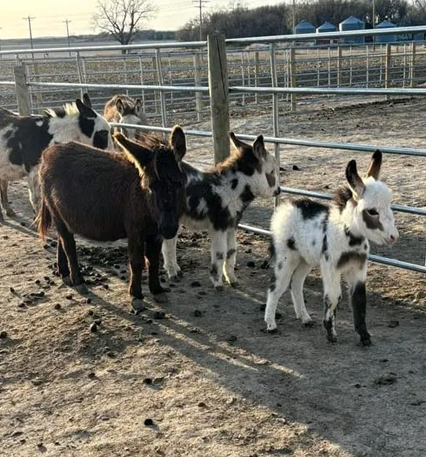- info@minidonkeyranch.com
- +1 (530) 812 1481
Health
To keep mini animals healthy, ensure they receive regular veterinary care, vaccinations, and deworming as recommended. Provide a clean, dry shelter, constant access to fresh water, and a well-balanced, species-appropriate diet. Keep their living space free of waste to prevent infections and hoof problems, and trim hooves regularly. Monitor their weight, behavior, and appetite daily to catch any early signs of illness. Social interaction, proper grooming, and plenty of exercise are also key to supporting both their physical and mental well-being.
Recommended Health Tests From the National Breed Club:
- Hip Evaluation
- Elbow Evaluation
- Cardiac Exam
- Ophthalmologist Exam

Grooming
Grooming mini animals is essential for their hygiene and overall health. Regular brushing removes dirt, loose hair, and parasites, while also promoting blood circulation and bonding. Mini horses and donkeys need daily grooming and hoof cleaning, especially if they’re active or in muddy areas. Mini pigs benefit from occasional wiping with a damp cloth and skin moisturization to prevent dryness. Goats and mini cows enjoy brushing, particularly during shedding seasons. Always check ears, eyes, and hooves during grooming to catch early signs of infections or injuries and trim hooves every 6–8 weeks to prevent overgrowth.

Exercise
Mini animals need regular exercise to stay physically fit, mentally stimulated, and emotionally balanced. Allow daily access to safe, open spaces where they can roam, graze, or explore. Mini horses and donkeys benefit from walks, light training, or turnout time, while goats enjoy climbing structures and social play. Mini pigs can be encouraged to move with toys, rooting areas, or short leash walks. Even mini cows need gentle movement through pasture rotation or guided walks. Always tailor the intensity and duration of exercise to the animal’s age, health, and breed, and supervise play to prevent injury.

Training
Training mini animals requires patience, consistency, and positive reinforcement. Start with short, daily sessions using treats and praise to reward good behavior. Use clear, simple commands and avoid punishment, as it can cause fear and resistance. Mini horses and donkeys respond well to lead training and gentle handling, while mini pigs can learn tricks and litter training with food rewards. Goats are curious and smart, making them great candidates for obstacle courses and basic commands. Keep training fun, calm, and consistent to build trust and encourage cooperation.

Nutrition
Proper nutrition is vital for mini animals to prevent obesity, support growth, and maintain overall health. Feed them species-specific diets with the right balance of fiber, protein, vitamins, and minerals—high-quality hay should be the foundation for most, especially mini horses, donkeys, and goats. Avoid overfeeding grains or treats, as mini animals have slower metabolisms and are prone to weight gain. Provide constant access to clean water and salt or mineral blocks where appropriate. Consult a vet or animal nutritionist to adjust their diet based on age, activity level, and any special health needs.
